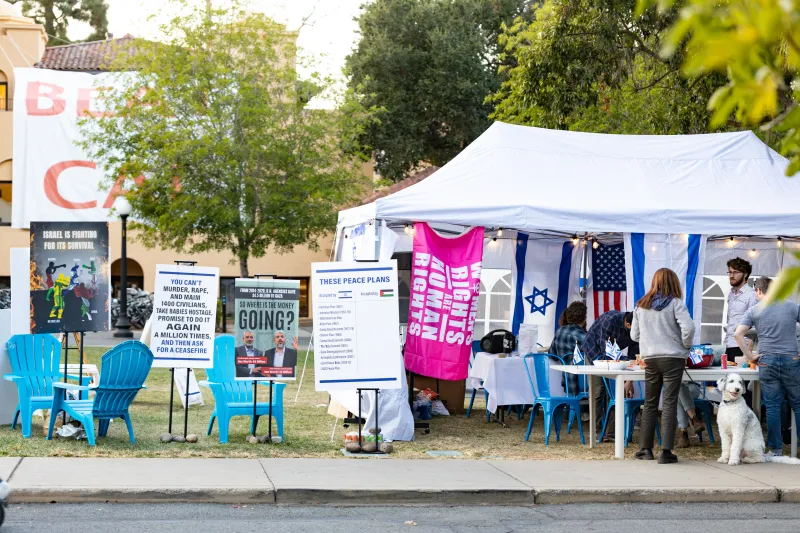A collection of four tents at the center of White Plaza with the stated goal of disseminating information about the ongoing Israel-Gaza War and providing a safe refuge for Jewish and Israeli students, according to organizers, was knocked down by storms on Sunday.
Severe weather conditions due to a Pacific storm caused heavy rainfall and winds, allegedly knocking down the tents. However, the organizers said they are requesting camera footage from the Stanford Bookstore to assess if there was foul play.
Though organizers did not respond to a request to comment following the storm about plans to reassemble the tents, The Daily previously spoke to organizers about their goals and plans.
In the three months it stood at White Plaza, the Blue and White Tent, as its organizers referred to it, evolved from just one table to four tents with televisions and banners. It was set up across the Sit-In to Stop Genocide by the Jewish and Israeli community on Nov. 13 and hoped to “stop the polarized conversation” on the Israel-Gaza war and incentivize healthy dissemination of information on both sides of the spectrum, organizers said.
Kevin Feigelis, a seventh-year physics Ph.D. student and a member of the Blue and White Tent, told The Daily in December that “Stanford is not doing enough to combat antisemitism on campus.” He said education on antisemitism on campus is either “incorrect” or insufficient.
“I think it’s been very clear to us as Jewish and Israeli students that the education students are getting is almost wrong,” Feigelis said.
Though the ‘Sit-in to Stop Genocide’ has been sleeping overnight in tents, organizers of the Blue and White Tent did not sleep overnight at the venue.
According to organizers, the initiative is a way for Stanford community members to learn about the Jewish and Israeli perspective on the conflict and to feel for both sides of the Israel-Gaza War.
“I personally believe that there’s tragedy on both sides,” said Michelle Karlsberg ’24, another member of the tent. “We continue to have empathy for both sides. That’s what I believe Stanford stands for, not discriminating on the basis of ethnicity or religion.”
Karlsberg said she believed everyone should have freedom of speech at any time or place, “as long as it’s not hate speech.”
“We are here to make our voices heard,” she said.
Some sit-in participants said they were “offended” by some of the rhetoric and signage of the Blue and White Tent.
“Most of our interactions with the tent have frankly not adhered to the communication norms that we try to uphold as a sit-in,” said Hana Spahia ’26, a sit-in organizer.
Referring to signs depicting “dark-skinned assailants attacking these helpless white victims” or comparing Palestinian militants to wolves, Spahia said some of the tent’s messaging plays into “racist tropes.”
“The dehumanization that is being perpetuated in order to manufacture consent for the continuation of a genocide is frankly disgusting,” Spahia said.
To Feigelis, the messaging at the Tent is not intended to be about race.
“The depiction of the art has nothing to do with race, it has nothing to do with Palestinian civilians,” he said. “People who are conflating Palestinian civilians with Hamas confuse me. Hamas is a terrorist organization.”
Some students who passed by the tent said they found it to be impactful. Brennan Nick ’24, a passerby who said he is a “big supporter” of political discourse, said he thought “people having the courage to talk about their views … is very good.”
Organizers said many community members have stopped by, volunteered to be a part of the tent’s efforts and even made donations to the initiative. The Blue and White Tent has also set up a GoFundMe page for supporters to donate to, through which they have raised $26,294 as of Feb. 5.
Tent organizers also held a Dec. 5 panel on military and international law with two former members of the Israel Defense Forces (IDF) legal team. They also partnered with the Stanford Hindu Students Association (HSA) to host a Hindu-Jewish solidarity event.
Karlsberg said it was most important for the Jewish community to be with their families, and urged them to reach out to Hillel for emotional support.
“I think the most valuable thing for all of us is community and being together for Palestinians, for Israelis and for Jews,” he said. “I wish we could support those students right now. I wish we could support all students all the time.”
Both Feigelis and Karlsberg said they encouraged students to reach out to them or to Hillel for support. “There is a lot of support out there,” Feigelis said.
In response to a request for comment, the University directed The Daily toward its Nov. 13 statement announcing the creation of the Antisemitism, Bias and Communication Subcommittee.
